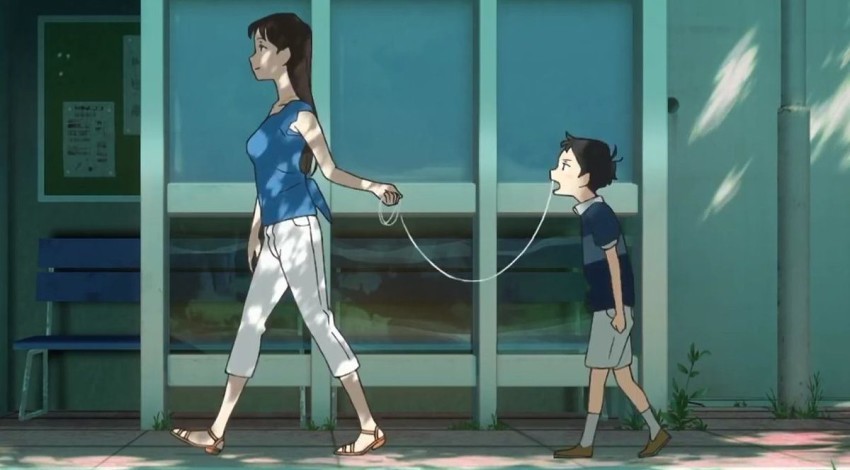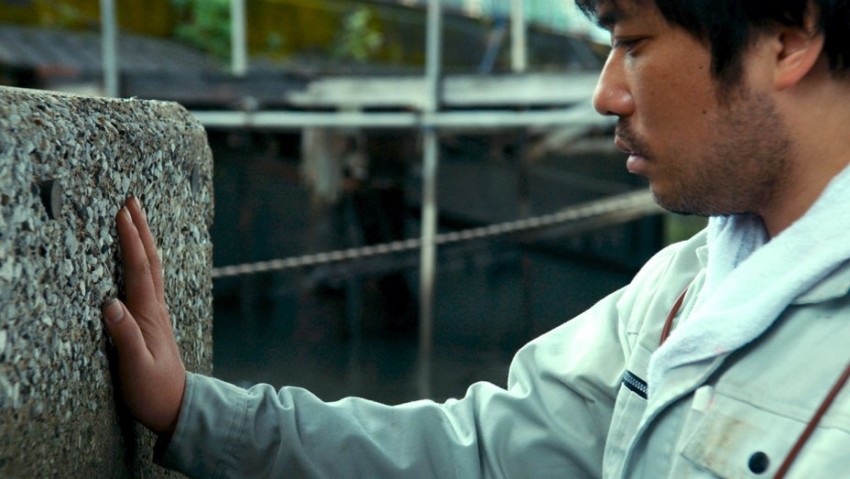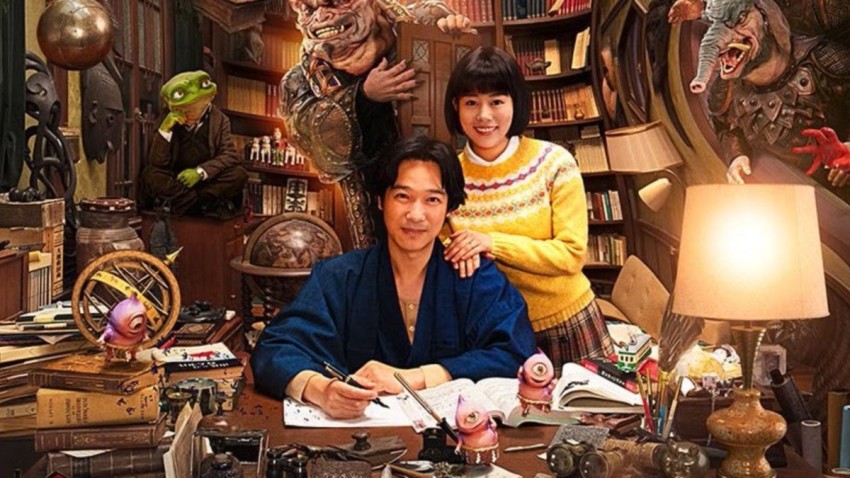Japan Foundation Film Tour 2019
January 8, 2019 · 0 comments
By Jasper Sharp.
 The Japan Foundation UK Touring Film Programme has announced its 2019 programme, and it looks like they are putting out a whole lotta love, with “People Still Call It Love: Passion, Affection and Destruction in Japanese Cinema.”
The Japan Foundation UK Touring Film Programme has announced its 2019 programme, and it looks like they are putting out a whole lotta love, with “People Still Call It Love: Passion, Affection and Destruction in Japanese Cinema.”
Once more, we see the season snowballing in terms of size and reach, with a total of 18 films this year – two more than 2018 – based around such universal themes as passion, desire, affection, romantic love, young love, maternal love, paternal love, mad love, bad love, and all permutations thereof.
There is one more venue involved this year too, bringing the total up to 19, although the dates remain the same: from 2nd February to 28th March, on any given day, a Japanese film is pretty much sure to be screening somewhere in the UK. As per usual, proceedings will be kicking off at the Institute of Contemporary Arts, and all of the venues involved are listed here.
Top of the pile for the films in terms of advance reputation is Tremble All You Want (2017), a new(ish) romcom about a mousy 24-year-old office drone Yoshika and her stumbling attempts to overcome a teenage fixation with a crush from her school days, a fellow named Ichi.
It might not sound exactly ground breaking, but the critical consensus is that this is a spry and sprightly film. Mark Schilling used words such as “delightful” and “effervescent” in his Japan Times review. He singled out Mayu Matsuoka’s central performance as “star-making”, and throughout 2018 the actress has become a ubiquitous presence in the Japanese media, while audiences abroad have more recently had a chance to see her in Hirokazu Kore’eda’s Cannes prize-winner Shoplifters.
Director Akiko Ohku’s name may not be a familiar one, although she has already amassed some half dozen features over the past decade. Tremble All You Want might characterise her work in the kind of female-fronted popular commercial entertainment that tends to fall outside the remit of Cannes, Berlin, Rotterdam or other arthouse-oriented international film festivals. Nevertheless, since winning the audience award for its international premiere at Tokyo Film Festival in 2017, Tremble All You Want has followed the typical Asian film festival route to play at Far East Film Festival in Udine, Nippon Connection in Frankfurt, Camera Japan in Rotterdam and at the Japan Society in New York – and it just has been announced literally a matter of days ago that Third Window Films will be putting it out on home video in April. Certainly one to catch on the big screen if the tour is swinging by you.

Two further features by female filmmakers take a more down-to-earth look at what happens once the wedding bells stop ringing. Another ubiquitous face from Japan, Tadanobu Asano, fronts Dear Etranger (2017), directed by Yukiko Mishima, as a 40-something who enters into his second marriage with a more pragmatic outlook on family life, taking on the role of father figure to his partner’s children before she becomes pregnant and the family dynamics begin to shift.
Good Stripes (2015) follows the trials of a couple forced to confront each other’s flaws, foibles and radically different social backgrounds after an unplanned pregnancy prompts them to do the right thing (or perhaps the wrong thing). Personally, I am intrigued by this one. I programmed director Yukiko Sode’s first indie feature Mime Mime (2008) for Raindance back in 2009, and had wondered what this filmmaker had been up to since, but it seems like in style and subject matter, this is a warm but slightly cutting depiction of human folly in a not dissimilar vein.
Before going on to look at some of the other recent films, this year’s retrospective screening is a really welcome one. Where Chimneys Are Seen (1953) is one of those titles that always crops up when reading about classic Japanese cinema from the 1950s, by one of those directors from the period, Heinosuke Gosho, about whom a lot of people talk but whose work surprisingly few have seen. This title, about an impoverished newlywed couple living in an industrial district of Tokyo, who take in an abandoned child to raise as their own, won a prize at the 1954 Berlin Film Festival and Donald Richie described it as “one of the really important postwar films”. Definitely top of the must-see list for cinephiles.
There is a slightly disappointing lack of older titles compared with previous years, with the bulk of the films in the programme from the last couple of years. This is either because the Japan Foundation seems to be taking up the slack from a lapse in interest in contemporary Japanese cinema from the major UK film festivals, or maybe contributing to this lapse in interest by making sure all the best films secure their premiers before the UK festival season begins.
 The argument for the former case seems stronger. It is absolutely shocking to note that Ryosuke Hashiguchi’s poignant multi-threaded drama, Three Stories of Love (2015), has not been screened in the UK until now, especially given that its director’s pioneering treatment of gender, sexuality, and relationships in films such as Like Grains of Sand (1993), Hush (2001) and All Around Us (2008) have all either enjoyed theatrical runs, London Film Festival premieres or played as part of previous Japan Foundation tours. I caught Three Stories of Love at Udine a few years back and I can vouch for the fact that Hashiguchi’s latest is of a very high quality and definitely one to prioritise from the programme.
The argument for the former case seems stronger. It is absolutely shocking to note that Ryosuke Hashiguchi’s poignant multi-threaded drama, Three Stories of Love (2015), has not been screened in the UK until now, especially given that its director’s pioneering treatment of gender, sexuality, and relationships in films such as Like Grains of Sand (1993), Hush (2001) and All Around Us (2008) have all either enjoyed theatrical runs, London Film Festival premieres or played as part of previous Japan Foundation tours. I caught Three Stories of Love at Udine a few years back and I can vouch for the fact that Hashiguchi’s latest is of a very high quality and definitely one to prioritise from the programme.
A quick precis of some of the remaining choices: despite the seemingly frivolous (although admittedly memorable) title, Ryota Nakano’s Her Love Boils Bathwater (2016), starring Rie Miyazawa (Twilight Samurai, Tony Takitani), tackles the poignant theme of a wife and mother’s attempts to keep her household running on keel after she is diagnosed with terminal cancer.
Fathers get the affectionate treatment, too, in Masakazu Fukatsu’s Dad’s Lunch Box (2017), in which a divorced salaryman’s tenderness for his teenage daughter is conveyed by the daily bento boxes he prepares for her to take to school.
My Friend “A” (2018) is the latest from the extremely versatile, not to mention extremely prolific Takahisa Zeze, its austere mystery-murder tale seemingly an odd fit for a season about love, but further proof of the sheer amount of ground the director has put between his pink-film beginnings.
The Scythian Lamb (2018), the latest from Daihachi Yoshida (Funuke Show Some Love, You Losers, Pale Moon), sees him back in blackly comic mode with Ryuhei Matsuda as one of the three violent ex-cons employed as deliverymen by a government-run initiative to keep prison numbers down, all of whom fall for the same girl.
 Takashi Yamazaki’s family-friendly fantasy Destiny: The Tale of Kamakura (2017) brings together a colourful parade of ghosts, goblins and other mystical beings in an imaginative tale in which love and friendship sit at the core.
Takashi Yamazaki’s family-friendly fantasy Destiny: The Tale of Kamakura (2017) brings together a colourful parade of ghosts, goblins and other mystical beings in an imaginative tale in which love and friendship sit at the core.
With Tonight, at the Movies (2018), Thermae Romae director Hideki Takeuchi whisks us back to the glory days of the studio system in 1960, with a magical-realist rom-com fantasy about a screenwriter’s infatuation with a siren of the silent screen.
If I have skipped over a couple of titles, it is not because they are of lesser interest, but due to what might be seen as an emerging problem with these seasons, in that there is essentially too much on offer for one single person to handle over the course of a week or two.
Still, this is hardly a major criticism, so I’ll wind just up here with mention of the one anime title of the tour, Penguin Highway (2018), adapted from a 2010 award-winning sci-fi novel by Tomihiko Morimi about a waddle of penguins mysteriously appearing in the village of a young boy.
Penguin Highway is the first feature film from the new Studio Colorido, founded by director Hiroyasu Ishida, known for his short films Paulette’s Chair (2014) and Fastening Days (2014), and ex-Studio Ghibli character designer Yojiro Arai. You can read more about it here, of course, since it won the Judges’ Award at last year’s Scotland Loves Anime.
Jasper Sharp is the author of the Historical Dictionary of Japanese Cinema. The Japan Foundation Tour begins on 2nd February 2019, and runs in multiple cinemas across the UK until 28th March.
Leave a Reply